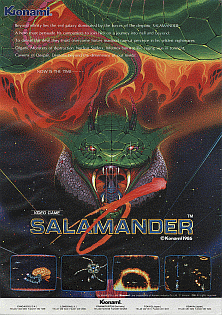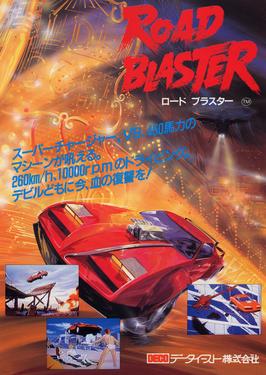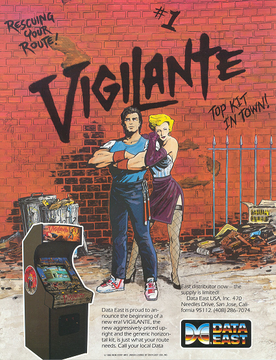
Ikari Warriors, known as Ikari in Japan, is a vertically scrolling run and gun video game released for arcades by SNK in 1986. It was published in North America by Tradewest. At the time there were many Commando clones on the market. What distinguished Ikari Warriors were rotary joysticks and a two-player cooperative mode. The rotary joystick controls were in turn based on SNK's earlier TNK III (1985). Ikari was originally intended to be an official licensed adaptation of the film Rambo: First Blood Part II (1985), but SNK were initially unable to acquire the rights to the film.

Salamander, retitled Life Force in North America and in the Japanese arcade re-release, is a scrolling shooter arcade video game developed and published by Konami. Released in 1986 as a spin-off of Gradius, Salamander introduced a simplified power-up system, two-player cooperative gameplay and both horizontally and vertically scrolling stages. Some of these later became normal for future Gradius games. In Japanese, the title is written using ateji, which are kanji used for spelling foreign words that has been supplanted in everyday use by katakana. Contra, another game by Konami was also given this treatment, with its title written in Japanese as 魂斗羅.

Moon Patrol is a 1982 arcade video game developed and released by Irem. It was licensed to Williams for distribution in North America. The player controls a Moon buggy which can jump over and shoot obstacles on a horizontally scrolling landscape as well as shoot aerial attackers. Designed by Takashi Nishiyama, Moon Patrol is often credited with the introduction of full parallax scrolling in side-scrolling games. Cabinet art for the Williams version was done by Larry Day. Most of the home ports were from Atari, Inc., sometimes under the Atarisoft label.

"Ali Baba and the Forty Thieves" is a folk tale in Arabic added to the One Thousand and One Nights in the 18th century by its French translator Antoine Galland, who heard it from Syrian storyteller Hanna Diyab. As one of the most popular Arabian Nights tales, it has been widely retold and performed in many media across the world, especially for children.

Yie Ar Kung-Fu is an arcade fighting game developed and published by Konami. It first had a limited Japanese release in October 1984, before having a wide release nationwide in January 1985 and then internationally in March. Along with Karate Champ (1984), which influenced Yie-Ar Kung Fu, it is one of the games that established the basis for modern fighting games.

Konami's Ping Pong is a sports arcade game created in 1985 by Konami. It is the first video game to accurately reflect the gameplay of table tennis, as opposed to earlier simplifications like Pong. It was ported to the Amstrad CPC, Commodore 64, Famicom Disk System, MSX, and ZX Spectrum.
Gradius is a series of shooter video games, introduced in 1985, developed and published by Konami for a variety of portable, console and arcade platforms. In many games in the series, the player controls a ship known as the Vic Viper.

Gun.Smoke is a vertically scrolling run and gun video game and designed by Yoshiki Okamoto and released in arcades in 1985. Gun.Smoke centers on a character named Billie Bob, a bounty hunter going after the criminals of the Wild West.

Toobin' is an Atari Games and Midway Games arcade video game released in 1988. It is based on the recreational activity tubing. Toobin' was ported to the Amiga, Commodore 64, Atari ST, Amstrad CPC, Nintendo Entertainment System, MS-DOS, Game Boy Color, ZX Spectrum, and MSX. Players assume control of tubers Bif or Jet, guiding them along vertically scrolling rivers on an inner tube.

Road Blaster (ロードブラスター) is an interactive movie video game developed by Data East featuring animation by Toei Animation, originally released exclusively in Japan as a laserdisc-based arcade game in 1985. The player assumes the role of a vigilante who must avenge the death of his wife by pursuing the biker gang responsible for her death in a modified sports car. The game would later be ported to a variety of home formats such as the MSX and Sharp X1, Sega CD, LaserActive, PlayStation and Sega Saturn. The Sega CD and Mega-LD versions were released outside of Japan under titles of Road Avenger and Road Prosecutor respectively.

Vigilante (ビジランテ) is a 1988 beat 'em up arcade video game developed and published by Irem in Japan and Europe, and published in North America by Data East. It is considered as a spiritual sequel to Irem's earlier Kung-Fu Master (1984).

Indiana Jones and the Temple of Doom is an action video game developed and published by Atari Games and released in arcades in 1985. It is based on the 1984 film of the same name, the second film in the Indiana Jones franchise. It is the first Atari System 1 arcade game to include digitized speech, including voice clips of Harrison Ford as Indiana Jones and Amrish Puri as Mola Ram, as well as John Williams's music from the film.

WEC Le Mans, known as WEC Le Mans 24 in Japan, is a racing simulation video game released in arcades by Konami in 1986. It was the first racing video game to depict the 24 Hours of Le Mans World Endurance Championship (WEC). The Lap of Le Mans is split up into three sections, during which the time of day changes from day to dusk, dusk to night, and night to dawn.

Ali Baba and the Forty Thieves is dungeon crawl role-playing video game written by Stuart Smith for the Atari 8-bit computers and published by Quality Software 1981. An Apple II version was released in 1982, followed by ports for the FM-7 and the PC-8800 series in 1985. It is the second of four role playing games written by Smith, following Fracas, and preceding The Return of Heracles and Adventure Construction Set.

Bit Managers, formerly known as New Frontier, was a video game developer based in Barcelona (Spain). It was co-founded by Alberto Jose González, who composed the music for all of their games except Bang!, a coin-operated arcade machine.

The Dingoo is a handheld gaming console that supports music and video playback and open game development. The system features an on-board radio and recording program. It was sold to consumers in three colors: white, black, and pink. It was released in February 2009 and had sold over 1 million units.
Ali Baba and the Forty Thieves is a folk tale about Ali Baba, a character from Arabian literature.
Alberto José González Pedraza is a Spanish video game graphic artist, music composer, designer, producer, and co-founder of Bit Managers and Abylight, who has worked on a variety of titles, most notably games released by French video game publisher Infogrames. He has composed music for or worked on over 60 games, ranging from music composition to graphic programming, and eventually became one of the lead designers at the Spanish developer Abylight. Despite having composed dozens of full soundtracks for video games, González has never had any formal music training.

Rastan Saga, known as Rastan in North America, is a side-scrolling hack and slash arcade video game released by Taito in 1987. It was a critical and commercial success and was ported to home platforms.
















